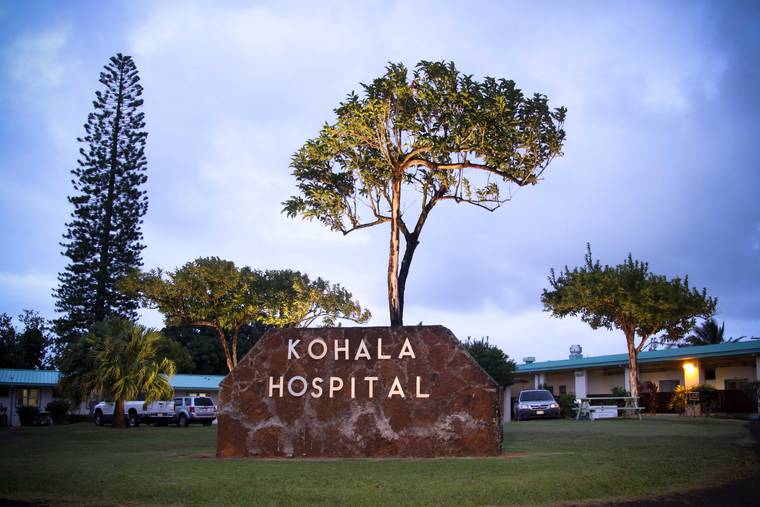KAILUA-KONA — A report released this month by two U.S. senators identified Kohala Hospital among a list of candidates for a program that puts increased scrutiny on nursing homes with a poor record of providing quality care.
But a spokesperson for the Kapaau facility said a recent visit by state surveyors suggests conditions there have been improving.
“It’s very island-style. It’s an older building, but it has a very family feel,” said Judy Donovan, West Hawaii regional director of marketing and strategic planning for Hawaii Health Systems Corp. “And yeah, I would be confident to have a parent or an aunt or an uncle there, absolutely.”
She said representatives from the state Office of Health Care Assurance just finished their long-term care and critical access hospital surveys this week and found no substantial findings or issues that posed “immediate jeopardy” to residents’ safety or health.
Donovan said they hope it will pull the facility out of a pool of candidates for a federal initiative that puts more intense scrutiny on nursing homes with consistent quality problems.
“I would hope so,” she said. “In looking at the candidacy ranking, it’s not clear how you get off of it. But I would assume that a good survey which puts you back into the average ranking would release that status.”
The hospital was identified as what the Centers for Medicare and Medicaid Services refer to as a special focus facility (SFF) candidate on a list included in a report by Pennsylvania Sens. Bob Casey and Pat Toomey.
The special focus facility initiative, created as part of a congressional overhaul of nursing home oversight, increases scrutiny for facilities with a history of falling short when it comes to providing quality care. Facilities selected as special focus facilities are subject to twice the number of survey visits per year as other nursing homes, CMS said, and face even more stringent enforcement as problems persist, ranging from fines to termination from participation in Medicare and Medicaid.
Within 18-24 months of becoming a participant in the initiative, CMS said, nursing homes can be graduated out of the program if they’ve made “significant improvements” that sustain over time or terminated from participating in Medicare. In cases where there’s been “very promising progress,” special focus facilities can get a time extension for their participation in the initiative.
One facility identified as an SFF is the Legacy Hilo Rehabilitation and Nursing Center, which, according to CMS, has carried that designation for 22 months and, as of May, is on a list of facilities that have shown improvement.
Candidates for participation in the initiative are identified based on the results of facilities’ three most recent surveys, and don’t include community input, state investigations or other information, according to the Casey-Toomey report. CMS provides each state with a list of candidates, and states select participants to fill any vacant slots in the program.
The number of slots, though, is limited by the availability of resources at CMS, and there are far more candidates qualifying for increased scrutiny than there are available slots. The Casey-Toomey report said there are 88 participants in the initiative and 435 candidates.
The report goes on to say that since 2005 more than 900 facilities have been put on the candidate list, and candidates only move onto the actual list of participating facilities when a space opens up.
But while the identities of facilities that make it onto the participant list are made public, the Casey-Toomey report said the identities of those on the candidate list aren’t, “despite being indistinguishable from participants in terms of their qualifications for enhanced oversight.”
According to Medicare’s website, Kohala Hospital has an overall rating of two out of five stars, “below average” with a health inspection rating of just one out of five stars, or “much below average.”
The hospital’s health inspection summary for the hospital counts a total of 25 citations, including allegations that the facility failed to ensure resident privacy and that it failed to ensure the nursing home area was free of accident hazards.
All deficiencies have since been corrected, according to the detailed report.
Donovan said representatives from the state Office of Health Care Assurance who surveyed the hospital this week found no problems that put residents’ health or safety in immediate jeopardy nor any substantial findings.
There were some “small deficiencies,” she said. CMS itself said most nursing homes have some deficiencies, with the average being between six and seven per survey.
Donovan said the exact number of deficiencies will be known when the survey is completed. She said normally if something is identified as a relatively quick fix it can be addressed immediately.
She said there’s no set timeline for the report’s completion, but said once it’s received, they have 10 days to address any deficiencies and report back to officials.



